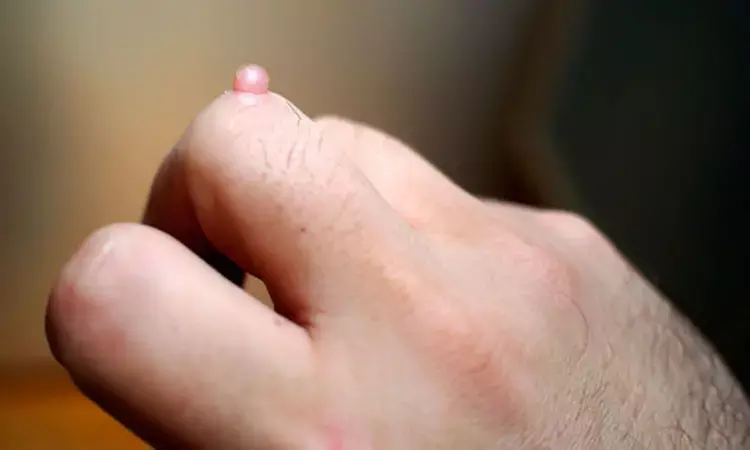- Home
- Medical news & Guidelines
- Anesthesiology
- Cardiology and CTVS
- Critical Care
- Dentistry
- Dermatology
- Diabetes and Endocrinology
- ENT
- Gastroenterology
- Medicine
- Nephrology
- Neurology
- Obstretics-Gynaecology
- Oncology
- Ophthalmology
- Orthopaedics
- Pediatrics-Neonatology
- Psychiatry
- Pulmonology
- Radiology
- Surgery
- Urology
- Laboratory Medicine
- Diet
- Nursing
- Paramedical
- Physiotherapy
- Health news
- Fact Check
- Bone Health Fact Check
- Brain Health Fact Check
- Cancer Related Fact Check
- Child Care Fact Check
- Dental and oral health fact check
- Diabetes and metabolic health fact check
- Diet and Nutrition Fact Check
- Eye and ENT Care Fact Check
- Fitness fact check
- Gut health fact check
- Heart health fact check
- Kidney health fact check
- Medical education fact check
- Men's health fact check
- Respiratory fact check
- Skin and hair care fact check
- Vaccine and Immunization fact check
- Women's health fact check
- AYUSH
- State News
- Andaman and Nicobar Islands
- Andhra Pradesh
- Arunachal Pradesh
- Assam
- Bihar
- Chandigarh
- Chattisgarh
- Dadra and Nagar Haveli
- Daman and Diu
- Delhi
- Goa
- Gujarat
- Haryana
- Himachal Pradesh
- Jammu & Kashmir
- Jharkhand
- Karnataka
- Kerala
- Ladakh
- Lakshadweep
- Madhya Pradesh
- Maharashtra
- Manipur
- Meghalaya
- Mizoram
- Nagaland
- Odisha
- Puducherry
- Punjab
- Rajasthan
- Sikkim
- Tamil Nadu
- Telangana
- Tripura
- Uttar Pradesh
- Uttrakhand
- West Bengal
- Medical Education
- Industry
Novel topical formulation of CY-002 works safe against cutaneous warts, study finds

Netherlands: The topical formulation of CY-002 was safe and manageable for daily treatment in patients with cutaneous warts, as per new findings from a randomized, placebo-controlled, first-in-human study, published in The Journal of the European Academy of Dermatology and Venereology.
CY-002 is a topical formulation of a new 27-amino acid alpha-helical tumour membrane-targeting peptide designed to deliver HPV-oriented, immune-targeted therapy in afflicted individuals. Treatments for cutaneous warts have traditionally focused on the destruction of epithelium rather than the targeting of HPV-infected keratinocytes. As a result, Lisa Pagan and colleagues carried out this trial to investigate the tolerability, safety, and effectiveness of topical CY-002 in people with cutaneous warts.
Potential participants were 18 years or older, in good health, and had 1, 3 mm cutaneous warts on their hands. A washout of wart-removing agents was necessary for 30-60 days prior to treatment with the topical formulation. Following the washout, participants made weekly visits to the clinical research facility for 28 days of at-home therapy, and were followed up on at 6- and 12-week intervals. Once daily, one droplet of 15–30 mg CY-002 1 percent or placebo cream was applied, followed by overnight occlusion, and treatment adherence, including safety and effectiveness data, was tracked using a mobile e-diary application.
The key findings of this study were as follows:
1. A total of 55 individuals were included in the trial, with 52 completing therapy and 49 completing follow-up.
2. Baseline and illness features were similar in all patients, while patients on placebo were more treatment-naive than those on CY-002, at 67.9% and 33.3%, respectively.
3. In both groups, the mean home treatment compliance was 27 doses (96.4%) of the 28 scheduled CY-002 doses.
4. Only two patients experienced moderate application site discomfort, and adverse events were comparable across groups.
5. Following CY-002 therapy, investigators noticed that 2 patients (7.7%) obtained full clearance and 4 (15.4%) had clearance of 1 of treated lesions, whereas full clearance was seen in 1 (3.8%) patient and 3 (11.5%) patients had clearance of 1 of the treated lesions.
In conclusion, in this trial, there was a substantial placebo response, and the gap between CY-002 and placebo did not approach statistical significance. Thinking about multiple medication delivery techniques might help in the creation of CY-002 for cutaneous warts.
Reference:
Pagan, L., Yfanti, C., Rijneveld, R., Todd, M., Jongste, P., Feijen, J., Klaassen, E., Bouwes Bavinck, J., Struijk, L., de Koning, M., Prestegarden, L., and Rissmann, R. (2022), Results of a randomized, placebo-controlled, first-in-human trial of topical CY-002 in patients with cutaneous warts. J Eur Acad Dermatol Venereol. https://doi.org/10.1111/jdv.18291
Neuroscience Masters graduate
Jacinthlyn Sylvia, a Neuroscience Master's graduate from Chennai has worked extensively in deciphering the neurobiology of cognition and motor control in aging. She also has spread-out exposure to Neurosurgery from her Bachelor’s. She is currently involved in active Neuro-Oncology research. She is an upcoming neuroscientist with a fiery passion for writing. Her news cover at Medical Dialogues feature recent discoveries and updates from the healthcare and biomedical research fields. She can be reached at editorial@medicaldialogues.in
Dr Kamal Kant Kohli-MBBS, DTCD- a chest specialist with more than 30 years of practice and a flair for writing clinical articles, Dr Kamal Kant Kohli joined Medical Dialogues as a Chief Editor of Medical News. Besides writing articles, as an editor, he proofreads and verifies all the medical content published on Medical Dialogues including those coming from journals, studies,medical conferences,guidelines etc. Email: drkohli@medicaldialogues.in. Contact no. 011-43720751


